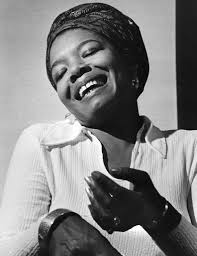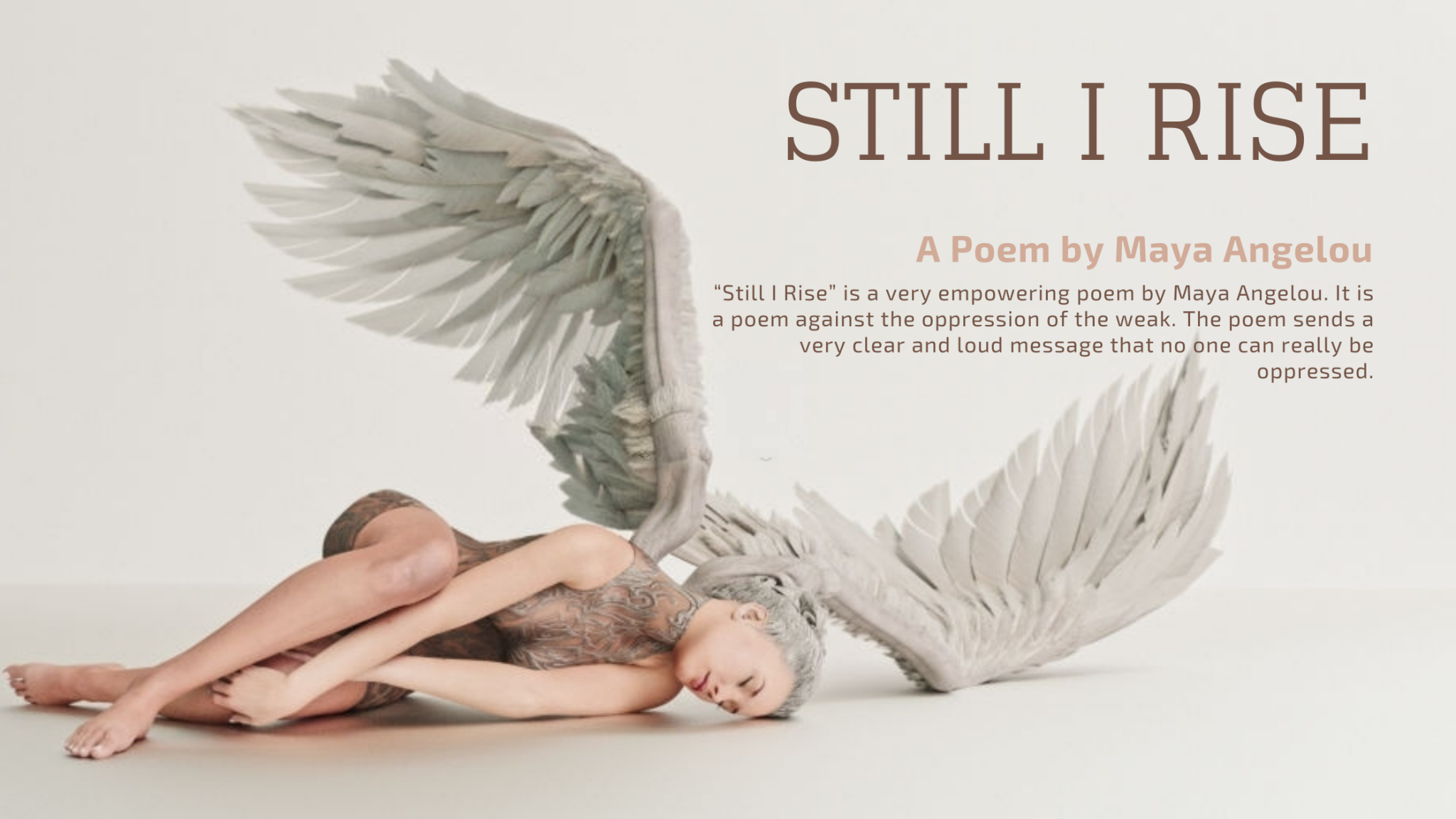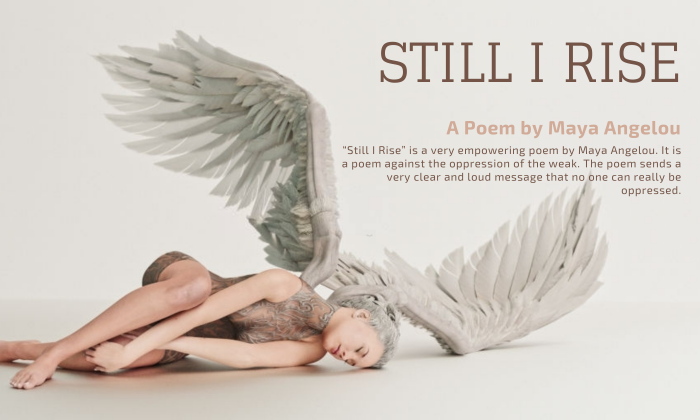Still I Rise – The Poem
You may write me down in history
With your bitter, twisted lies,
You may tread me in the very dirt
But still, like dust, I’ll rise.
Does my sassiness upset you?
Why are you beset with gloom?
‘Cause I walk like I’ve got oil wells
Pumping in my living room.
Just like moons and like suns,
With the certainty of tides,
Just like hopes springing high,
Still I’ll rise.
Did you want to see me broken?
Bowed head and lowered eyes?
Shoulders falling down like teardrops.
Weakened by my soulful cries.
Does my haughtiness offend you?
Don’t you take it awful hard
‘Cause I laugh like I’ve got gold mines
Diggin’ in my own back yard.
You may shoot me with your words,
You may cut me with your eyes,
You may kill me with your hatefulness,
But still, like air, I’ll rise.
Does my sexiness upset you?
Does it come as a surprise
That I dance like I’ve got diamonds
At the meeting of my thighs?
Out of the huts of history’s shame
I rise
Up from a past that’s rooted in pain
I rise
I’m a black ocean, leaping and wide,
Welling and swelling I bear in the tide.
Leaving behind nights of terror and fear
I rise
Into a daybreak that’s wondrously clear
I rise
Bringing the gifts that my ancestors gave,
I am the dream and the hope of the slave.
I rise
I rise
I rise.
~ by Maya Angelou
Still I Rise – Not The First Choice
Since long this poem has been revered as an anthem for the weak and oppressed. Nelson Mandela recited this poem in his first speech when he was released from jail. Why not? There is something about this poem by Maya Angelou. You say this poem, even in your mind, you have your spirits soaring high. You see a rush of energy to do something in life and rise up.
The other day, I told my cousin to read this poem to herself. I could see the rebel in her rise immediately. She wanted to rise above oppression. (She is not even oppressed). But jokes apart, I was listening to a very powerful recitation of this poem on the internet. I was immediately flooded by a series of questions. Two of them really hit me.
They say, be strong, throw some attitude, that’s the only way to weaken those who are trying to oppress you. But really? Will the oppression of weaker really end that way? I don’t think so.
Power-oppression-rebellion-(first-order)-freedom- and so on. I feel these are a vicious circle. It begins with people with power oppressing the weaker section of the society. When the oppression reaches a limit, the weaker one’s rebel for their freedom, their rights, etc. They succeed eventually. They also become powerful enough not to be oppressed. And then the other side of circle begins. Now that they have tasted the power. They want more of it. They work hard for more power. Then they become powerful. And then there is another weaker section in the society.
If this was not the case, has there ever been an instance in the history, where all the oppression ended?
The second question that runs through my mind is this. Okay, for a moment, even if I start to believe that my oppression will end. Let me make it clear, I am not oppressed or anything, but just for a hypothetical situation. If I walk like, there’s an oil well pumping in my living room, or laugh like there’s a gold mine in my back yard or dance like there are diamonds at the meeting of my thighs. If I throw the attitude and confidence like this, this will surely upset those who want to see me go down, to suffer, to be in pain (if there are any?). But the question is will it bring me any peace and happiness.
The answer is no. I don’t think it is anyone’s first choice to make other’s jealous of your achievements. The first choice is always to see others happy with your feats. The first choice is never victory, it is always harmony.
Still I Rise – Poem Analysis
They say, never oppress someone so much that they lose the fear. This poem is the voice of someone who has been oppressed so much that they have given up on the feeling of fear.
The poem states that there will be someone who might try and bring you down in every possible manner. By force, by power, by lies, by treachery, or by any other means. Their only aim might be to wipe you down from history. Maybe they want to build their empire whore roots are dug deep in your miseries and the pain that they inflict upon you.
But your aim should only be to keep yourself enough steady that you don’t give into their efforts. In fact, you have to show them that you are not at all affected by their acts. You have to walk with double the grace. That’s the only answer, perfect for their behavior.
Through the poem, the speaker is directly speaking to her oppressor. Throughout the poem she is addressing to them as “you” (“You may write me down in history with your bitter, twisted lies”). And this is the first sign that she has guts to raise her voice. And that she is not the one who can be pulled down that easily. Despite the inhuman conditions she still manage to maintain her “sassiness”, “haughtiness”, and “sexiness”. These virtues in enough quantity to upset ever her really powerful oppressor. Another symbol of her strength and endurance. Despite having nothing, she still has dare enough to walk like she belongs to the most elite class in the society. The has the power to give the most powerful a run for money.
The words “I Rise” is repeatedly used as a mantra that gives the speaker the power to forget the gravity of the circumstance and give the strength to come out of it all victorious. Overall, this is one of the most powerful poems ever written.
Still I Rise – Form, Meter & Structure
- The first eight stanzas of this poem is written in quatrains, with a rhyme scheme of A-B-C-B.
- The refrain “I Rise” is repeated across the poem and is used as a mantra that makes the poem really powerful.
- The poem is written in first person and the speaker is directly speaking to her oppressor.
- Despite all that she speaker had been through, there is no sad undertone in the poem. There is only positive attitude.
- The first eight paragraphs talks about the speaker’s attitude towards the second person. It is only the last paragraph that gives a hint of what she has been through in the past. (“Up from a past that’s rooted in pain”). But there is also a strong statement that past is past, and it will not be the future.
Maya Angelou

Maya Angelou born Marguerite Annie Johnson; April 4, 1928 – May 28, 2014) was an American poet, memoirist, and civil rights activist. She published seven autobiographies, three books of essays, several books of poetry, and is credited with a list of plays, movies, and television shows spanning over 50 years. She received dozens of awards and more than 50 honorary degrees. Angelou is best known for her series of seven autobiographies, which focus on her childhood and early adult experiences. The first, I Know Why the Caged Bird Sings (1969), tells of her life up to the age of 17 and brought her international recognition and acclaim.
She became a poet and writer after a string of odd jobs during her young adulthood. These included fry cook, sex worker, nightclub performer, Porgy and Bess cast member, Southern Christian Leadership Conference coordinator, and correspondent in Egypt and Ghana during the decolonization of Africa. She was also an actress, writer, director, and producer of plays, movies, and public television programs. In 1982, she was named the first Reynolds Professor of American Studies at Wake Forest University in Winston-Salem, North Carolina. She was active in the Civil Rights Movement and worked with Martin Luther King Jr. and Malcolm X. Beginning in the 1990s, she made approximately 80 appearances a year on the lecture circuit, something she continued into her eighties. In 1993, Angelou recited her poem “On the Pulse of Morning” (1993) at the first inauguration of Bill Clinton, making her the first poet to make an inaugural recitation since Robert Frost at the inauguration of John F. Kennedy in 1961. With the publication of I Know Why the Caged Bird Sings, Angelou publicly discussed aspects of her personal life. She was respected as a spokesperson for black people and women, and her works have been considered a defense of black culture. Her works are widely used in schools and universities worldwide, although attempts have been made to ban her books from some U.S. libraries. Angelou’s most celebrated works have been labeled as autobiographical fiction, but many critics consider them to be autobiographies. She made a deliberate attempt to challenge the common structure of the autobiography by critiquing, changing and expanding the genre. Her books center on themes such as racism, identity, family and travel.
To read more about Maya Angelou, click here.









Thank you for sharing this poem. I’ve known so far only that the poetess was a participant in Civil Rights Movement. I think, the power is enhanced by the direct speech to the opressor and by the iterative refrain. They give the poem a powerful emphasis. And they strenghthen and challenge the reader. Great poem. 👌😊